![]()
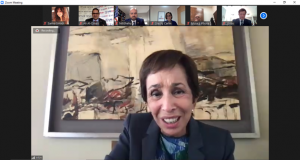
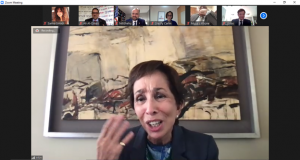
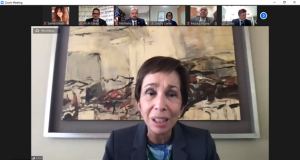
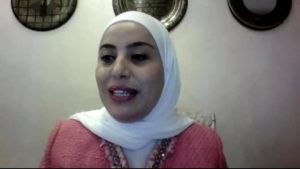
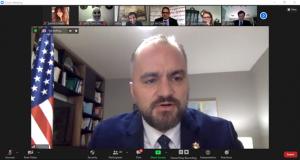
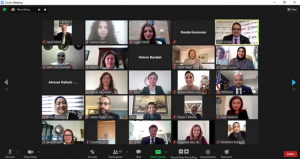
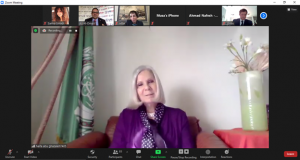
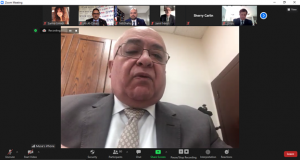
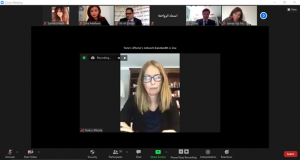
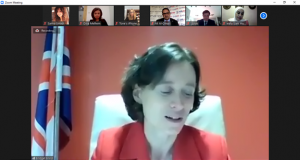
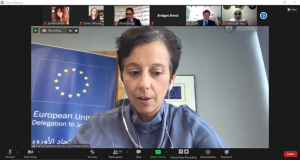
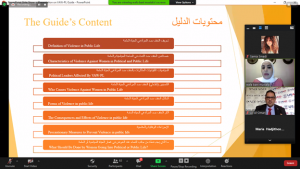
Her Highness Princess Basma bint Talal, Chairperson of the Jordanian National Commission for Women Affairs, and the Honorary Chair of the Coalition of Women MPs from Arab Countries to Combat Violence against Women, affirmed that the political participation of women is an imperative necessity to promote democratic life in all countries of the world, make it successful, and achieve its goals.
Her Highness indicated that women’s political participation contributes to enriching the democratic experiences of countries, improving the process of decision-making, and developing women’s experience in political work and their role in serving the society.
Her Highness said, in a speech delivered through a visual communication technology, today, Tuesday, at the virtual ceremony to launch the practical guide on violence against women in politics, that women’s fear of political violence stands as a major reason behind their weak political participation and their quest to reach leadership positions in many societies.
The virtual ceremony was organized by the Coalition of Women MPs from Arab Countries to Combat Violence against Women and the National Democratic Institute.
Her Highness indicated the importance of the guide in assisting female parliamentarians, members of municipal councils, political parties, syndicates’ councils, and women working in the public and private sectors, and directing them towards best practices for work and the full performance of their duties.
The Minister of Political and Parliamentary Affairs and the President of the Inter-Ministerial Committee for the Empowerment of Women, Eng. Musa Al-Maaytah, said that the march of Jordanian women’s participation in public life was and remained a general approach, a decision and a supreme political will since the establishment of the Jordanian state till the present. “This is confirmed by the legislative developments happened in all stages throughout the history of the Jordanian state.” He added
He added that the past five years have witnessed the issuance and amendment of legislation aimed at eliminating discrimination and violence against women, enhancing their participation in public life and protecting them from violence, referring to the role of the Committee for Combating Domestic Violence emanating from the Inter-Ministerial Committee for the Empowerment of Women, which worked to take the necessary measures to reduce cases of DV.
On the political level, Al-Ma`aytah stressed that the participation of women has developed since the adoption of the quota principle in the parliamentary elections in 2003, and its application in all forms of municipal and decentralized elections, leading to the current election law according to which the 2020 elections were held, and witnessed a wide participation of Jordanian female candidates with an increase of 44 % since 2016 elections, confirming the government’s belief in the positive impact of fighting all forms of violence as part of the development process.
The Chairperson of the coalition, Wafa Bani Mustafa, said that the launch of the first guide of its kind in the Arab world and the National Advisory Team came within the framework of the initiative, which was launched last year in cooperation between the Coalition of Women MPs from Arab Countries to Combat Violence against Women, the Jordanian Parliament, the Inter-Parliamentary Union, and the National Democratic Institute. She stressed the importance of the guide in empowering women in leadership and political positions in all countries of the world, to enable them to move into the public sphere and face all forms of discrimination and bullying.
USAID Mission Director in Jordan, Sherry Carlin, referred to the importance of the strategic partnership between Jordan and the United States of America that has spanned over 70 years, stressing the American commitment to support economic growth in Jordan to enhance the stability of the region.
She said that empowering women economically and politically contributes to promoting growth in all fields in Jordan. Ms. Carlin pointed to the role of the United States Agency for International Development in preparing and developing a guide to combating violence against women in public life, to ensure that women’s voices are heard, and to have the opportunity to participate in politics, economics and public life.
The director of the National Democratic Institute in the Middle East and North Africa, Arianit Shehu, announced that the institute launched a campaign to “modernize the face of politics”, to support the political empowerment of women, referring to the “Power to Women” initiative, which the institute adopts as an opportunity for women parliamentarians, businesswomen, businessmen, academics and government representatives to formulate discussing key policy issues with different parties, leading to building alliances and networks among women parliamentarians on gender-sensitive legislation.
Assistant Secretary-General of the League of Arab States, Head of the Social Affairs Sector, Ambassador Haifa Abu Ghazaleh, indicated that the League has taken concrete steps in combating and eliminating violence against women and has adopted many targeted strategies in this field.
The guide includes the definition of political violence, its characteristics, its forms, its perpetrators, politicians affected by it, and how to address this form of violence that threatens efforts aimed at achieving equality and reducing the gender gap, pushing many women politicians and leaders to leave their positions, and it became a negative message for young women leaders in the future.
Former MP Jamil Al-Nimri, a member of the National Advisory Team, indicated that the team works voluntarily to help women in public work, by reviewing laws and regulations, coordinating efforts and providing advice to women in public work to help them address forms of violence in public life particularly bullying on social media.
The launch witnessed wide interventions by a number of experts, representatives of civil society organizations and parliamentarians, stressing the importance of addressing violence against women in public life and politics, to ensure that societies are dominated by values of justice, equality and respect for opinions and “the other” opinion.

 العربية
العربية